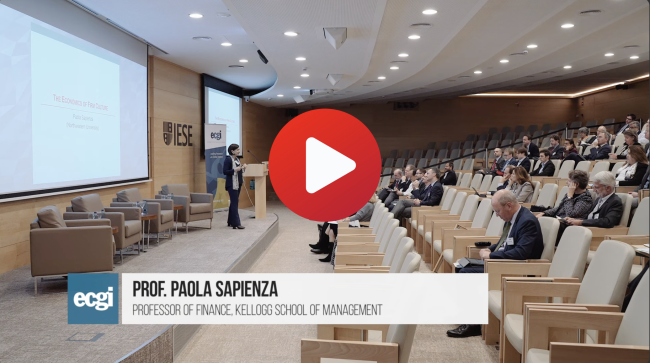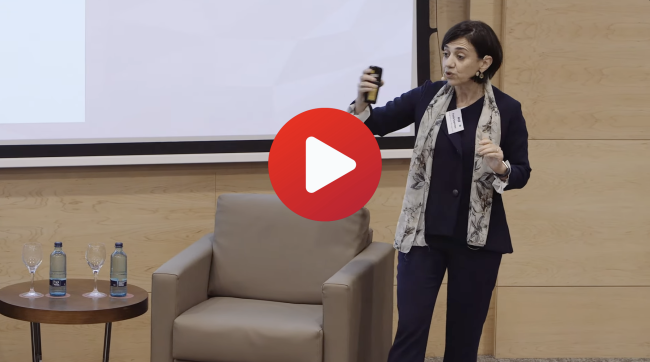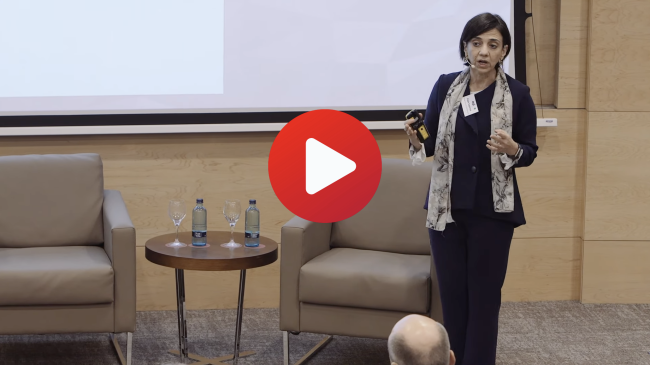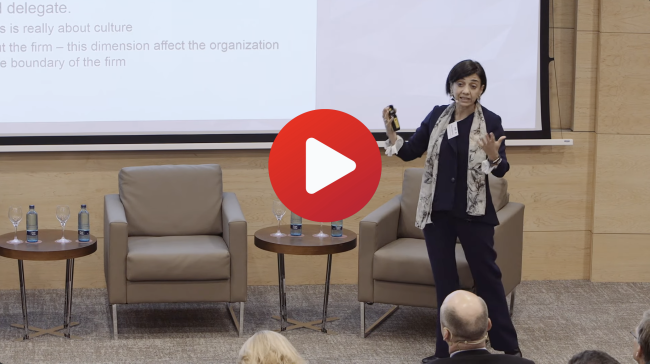ECGI Annual Lecture “The Economics of Firm Culture”
The 2019 ECGI Annual Lecture, titled "The Economics of Firm Culture," was presented by Prof. Paola Sapienza, the Donald C. Clark/HSBC Chair in Consumer Finance Professor at the Kellogg School of Management. Paola Sapienza is also a faculty research fellow at the National Bureau of Economic Research, a research affiliate of the Center for Economic Policy Research, and a Fellow of the European Corporate Governance Institute (ECGI). The lecture discussed the impact of culture within firms, its functions, and the role of managers in shaping it. Prof. Sapienza emphasized the need to integrate culture into the theory of the firm for a comprehensive understanding.
Top 6 Takeaways:
- Culture within firms significantly impacts organizational performance by influencing employee behavior, decision-making, and overall company identity.
- Managers play a crucial role in shaping firm culture by enforcing norms, values, and behaviors through various tools, such as reward systems and leadership styles.
- The persistence of firm culture over time depends on factors like managerial leadership, employee buy-in, and external influences, with some norms persisting while others evolve in response to changing circumstances.
- The evidence for corporate culture is thin due to firms' reluctance to share data objectively.
- Culture within firms should be defined based on the production function and organizational structure, as this can help determine the boundaries of the firm and influence how workers interact and behave.
- The need to incorporate culture into the theory of the firm, suggesting that current theories may not fully account for the unique aspects of culture within organizations.
Video Timeline Summary
- Welcome speech by Jordi Canals, Guy Jubb, and Marco Becht at the 2019 European Corporate Governance Institute (ECGI) annual meeting hosted by IESE Barcelona.
- Introduction of the ECGI 2021 Wallenberg Lecture speaker, Paola Sapienza, who will discuss the concept of corporate culture and its impact within firms.
- The literature on the economics of culture has focused on defining and measuring culture as beliefs, values, and preferences that are transmitted across generations.
- The speaker explores the role and purpose of a firm's culture, drawing parallels with society's sculpture.
- The importance of considering both local and firm culture, as well as institutional and legal constraints when defining the role of culture, using Germany's past acceptance of bribes as an example.
- An example of Amazon's 12 leadership principles illustrates the concept of a shared framework within the company.
- The need to integrate culture within the theory of the firm.
- Amazon's leadership claims they can teach higher standards, plan to hire based on potential, and will ingrain these principles over time.
- In 2009, a pasta factory Barilla faced high absentee rates, but managed to improve its culture, becoming the plant with the lowest absenteeism among all its branches.
- The company tried to address the issue by offering attendance-based bonuses, but this did not solve the problem.
- The changing the culture was the only option to address the issue of high absenteeism in the factory, with workers becoming more engaged and identifying more with the company.
- The formation of firm culture is a complex process involving factors such as the values and beliefs of the entrepreneur, co-optation of employees with similar beliefs, and the influence of local culture.
- Firm culture can also emerge from the common experiences and backgrounds of employees, as well as through training and leadership by managers.
- Integrating the concept of firm culture within the theory of the firm is necessary for a comprehensive understanding of organizational dynamics.
- Culture acts as a coordination device within firms.
- Culture affects beliefs and actions, but not individual preferences.
- Culture provides the members of the organization with a guide to the decisions they must make.
- A strong culture can influence employees' preferences and identity within an organization towards a higher standard.
- This can serve as a cost-effective way to motivate workers by shaping their values instead of providing incentives.
- Culture within firms can prevent coordination failure and reduce costs by providing intrinsic motivation and a sense of purpose for employees.
- Culture can contribute to the evolution of societal norms.
- The evidence on the impact of corporate culture is thin due to lack of data sharing by firms.
- Local culture influences corporate culture, as shown by studies on IBM and the relationship between headquarters' location and decentralization.
- Firms often advertise values that do not align with their actual practices, which is a challenge for empirical research on corporate culture.
- The importance of integrating culture within the theory of the firm for a comprehensive understanding.
- The significance of entrepreneurs, managers, and workers in shaping this culture, as well as the impact of local culture.
- The speaker proposes a simple model that considers the complementarity between culture, production function, and organizational structure in defining the boundaries of the firm.









